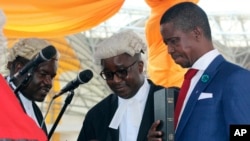Edgar Lungu has been sworn in as Zambia’s sixth president, following a closely fought election. Zambians voted Tuesday for a successor to President Michael Sata who died in October of last year. The new leader will take the helm of the copper-rich country for the remainder of Sata’s term before the country returns to the polls in September 2016.
Lungu, from the ruling Patriotic Front (PF) party, clinched the presidential seat by a slender margin (48.3 percent to 46.7 percent), beating his closest rival, Hakainde Hichilema from the United Party for National Development (UPND).
As he was inaugurated in Lusaka, President Lungu said Zambia will maintain a new mineral royalty tax despite fears that it could lead to mine closures, reported Reuters.
Africa's second biggest copper producer hiked open pit mining royalties to 20 percent from 6 percent and underground royalties to 8 percent from 6 percent in its 2015 budget, a move mining companies have said could cost 12,000 jobs.
The metal accounts for about 70 percent of Zambia's exports and 13 percent of its GDP (Gross Domestic Product), but at current prices the industry is barely viable.
Speaking after being sworn in at a colorful ceremony at the National Heroes Stadium, Lungu said his government's policies would remain consistent and predictable.
An 'ordinary Zambian'
The tall, slim, former lawyer who describes himself as an "ordinary Zambian of humble beginnings," helped form the PF with Michael Sata in 2001. When the party first came to power in 2011, he held a junior position in disaster management but climbed the ranks to become justice and defense minister, leading the country in Sata’s absence last year.
A lawyer, who requested anonymity, described his former colleague as the, “strong, quiet type,” telling VOA in Lusaka that Lungu was driven by his discipleship to Sata, which allowed him to stay in the inner circle of the Patriotic Front.
Lungu’s presidential campaign tapped into the sympathy and popular support for President Sata, promising to fulfill the late president’s ambitious development mandate. He will also have to unify a party that was badly fractured by a power struggle following Sata’s death, says political analyst, Alex Ng’oma.
“One would expect Lungu in the first place to try and bring all the factions together in a unity of purpose so as to strengthen the party’s position," he said. "But beyond that, I think that Lungu will have to continue along the same path that was walked by the late President Michael Sata. He has to make sure that the country has a new constitution before 2016, he has to make sure that this unprecedented infrastructure development that Michael Sata started is not halted.”
Voting irregularities alleged
United Party for National Development (UPND) candidate Hakainde Hichilema, who made his fourth run at the presidency, has alleged discrepancies in the vote counting process.
Canisius Banda, deputy president of the UPND in charge of politics, said the results must be verified thoroughly.
"We have evidence that this election has been rigged. There are gross irregularities, which the Electoral Commission of Zambia itself is aware of and has admitted that a number of results had been adulterated by people they don’t know. But we know the people. Some of them are workers within the Electoral Commission of Zambia,” said Banda.
Polling was protracted over three days as heavy rains thwarted the delivery and collection of ballot boxes in rural areas. The electoral commission expressed concerns about voter turnout, the lowest in the country’s democratic history, averaging around 32 percent, but in some areas falling as low as 20 percent.
The U.S. State Department congratulated the people of Zambia for upholding their democratic traditions and said it looks forward to strengthening its relationship with the country and its newly elected president.




